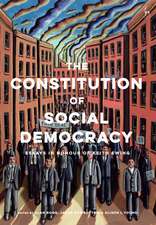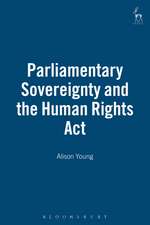The UK Constitution after Miller: Brexit and Beyond
Editat de Mark Elliott, Jack Williams, Alison L Youngen Limba Engleză Hardback – 25 iul 2018
| Toate formatele și edițiile | Preț | Express |
|---|---|---|
| Paperback (1) | 320.62 lei 43-57 zile | |
| Bloomsbury Publishing – 25 noi 2020 | 320.62 lei 43-57 zile | |
| Hardback (1) | 586.34 lei 43-57 zile | |
| Bloomsbury Publishing – 25 iul 2018 | 586.34 lei 43-57 zile |
Preț: 586.34 lei
Preț vechi: 826.23 lei
-29% Nou
Puncte Express: 880
Preț estimativ în valută:
112.20€ • 117.44$ • 93.38£
112.20€ • 117.44$ • 93.38£
Carte tipărită la comandă
Livrare economică 31 martie-14 aprilie
Preluare comenzi: 021 569.72.76
Specificații
ISBN-13: 9781509916405
ISBN-10: 1509916407
Pagini: 328
Dimensiuni: 156 x 234 x 26 mm
Greutate: 1.47 kg
Editura: Bloomsbury Publishing
Colecția Hart Publishing
Locul publicării:London, United Kingdom
ISBN-10: 1509916407
Pagini: 328
Dimensiuni: 156 x 234 x 26 mm
Greutate: 1.47 kg
Editura: Bloomsbury Publishing
Colecția Hart Publishing
Locul publicării:London, United Kingdom
Caracteristici
The leading statement on the UK constitution since the seminal case of Miller, which held that it is for Parliament not the executive to decide whether the UK invokes Article 50 to leave the EU, following the UK's referendum on the issue.
Notă biografică
Mark Elliott is Professor of Public Law at the University of Cambridge, and Fellow of St Catherine's College, Cambridge.Jack Williams is a Barrister at Monckton Chambers, London.Alison L Young is the Sir David Williams Professor of Public Law at the University of Cambridge.
Cuprins
1. The Miller Tale: An Introduction Mark Elliott, Jack Williams and Alison L Young2. Prerogative Powers After Miller: An Analysis in Four E's Jack Williams3. Miller and the Prerogative Anne Twomey4. Miller, Treaty Making and the Rights of Subjects Eirik Bjorge5. Miller, EU Law and the UK Paul Craig6. Of Power Cables and Bridges: Individual Rights and Retrospectivity in Miller and Beyond David Howarth7. Constitutional Change and Territorial Consent: The Miller Case and the Sewel Convention Aileen McHarg8. Sovereignty, Consent and Constitutions: The Northern Ireland References Gordon Anthony9. The Miller Case and Constitutional Statutes Sir John Laws10. Sovereignty, Primacy and the Common Law Constitution: What Has EU Membership Taught Us? Mark Elliott11. Miller, Constitutional Realism and the Politics of Brexit Richard Ekins and Graham Gee12. Miller and the Future of Constitutional AdjudicationAlison L Young
Recenzii
The largest compliment which this book can be paid is that it takes a case which was surrounded by partisan, and at times hysterical, arguments from both sides of the Brexit debate and has subjected the decision to rigorous, scholarly analysis. Every contribution to this book makes a significant entry into the academic discourse and I have no doubt that many of the essays will be subject to scrutiny and debate for many years to come.
As Brexit continues to unfold in 2019, the various chapters in this volume will be good resources for those who wish to gain a greater understanding of the constitutional ramifications of the UK leaving the EU, and the ongoing development of the UK Supreme Court.
Through twelve carefully put together contributions by pre-eminent figures in the UK constitutional landscape, The UK Constitution After Miller effectively tackles all different facets of the judgment.
As Brexit continues to unfold in 2019, the various chapters in this volume will be good resources for those who wish to gain a greater understanding of the constitutional ramifications of the UK leaving the EU, and the ongoing development of the UK Supreme Court.
Through twelve carefully put together contributions by pre-eminent figures in the UK constitutional landscape, The UK Constitution After Miller effectively tackles all different facets of the judgment.













